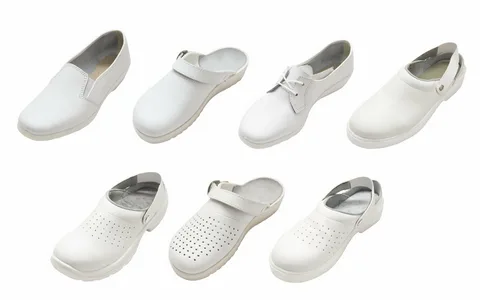Do you have a job that requires you to be on your feet all day? Many medical professionals, restaurant workers, and other occupations require long hours of standing, walking, and running around. Unfortunately, this can put a lot of strain on your feet, leading to discomfort and even serious injury. Investing in proper clinical shoes is important to protect your feet from harm. We will discuss the advantages of wearing proper clinical footwear to keep your feet happy and healthy.
Good Quality Materials Matter
When it comes to clinical footwear, quality matters; cheap shoes made from poor materials may seem like a good bargain, but they can cause more harm than good in the long run. Investing in a quality pair of clinical shoes can go a long way in keeping your feet happy and healthy.
High-quality materials are great options for clinical footwear. Not only do they look professional, but they are also durable and can withstand wear and tear over time. Shoes made from cheap synthetic materials may not hold up and can even lead to skin irritation and blisters.
Additionally, good quality materials can provide added support and cushioning for your feet. Look for shoes with padded insoles, reinforced arches, and heels. This will help distribute weight evenly across your feet and reduce the risk of developing foot pain or injuries.
Good quality materials can provide long-lasting support and comfort for your feet, preventing injuries and reducing fatigue.
Cushioning Is Important
When choosing the right clinical footwear, cushioning is a critical factor to consider. If you are a healthcare professional, you may spend long hours on your feet, moving from one patient to the next. Without proper cushioning, your feet may experience excessive pressure and strain, leading to pain, discomfort, and even injury.
Cushioning is designed to provide shock absorption and reduce the impact of each step you take. When choosing shoes, look for those with adequate cushioning.
For those with flat feet, shoes with extra cushioning and support can help correct the natural alignment of the feet and prevent issues such as plantar fasciitis, Achilles tendinitis, and shin splints. Similarly, those with high arches or underpronation may need less cushioning and more stability to avoid ankle injuries and stress fractures.
Soles Should Be Slip-Resistant
In a clinical setting, safety should always be a top priority. And when it comes to your footwear, slip resistance is essential. A slip-resistant sole will help prevent accidents that can lead to serious injuries or liability issues.
But slip resistance isn’t just about safety but also comfort and confidence. Knowing you can walk with a sure footing will make you feel more relaxed and focused, translating to better patient care.
The best slip-resistant soles are made of materials like rubber, polyurethane, or thermoplastic rubber, which offer a good grip even on wet or oily surfaces. Look for shoes with soles certified by recognized standards like ASTM or EN, as this ensures they meet minimum requirements for slip resistance.
Remember that slip resistance can wear down over time, so replacing your shoes regularly is important. Check the soles periodically for signs of wear, and don’t hesitate to replace them if they’re no longer providing adequate traction.
Finally, remember that slip resistance is just one factor when choosing clinical footwear. Be sure to consider other important features like support, cushioning, and breathability to ensure maximum foot comfort and protection.
Arch Support Is Key
Regarding proper clinical footwear, arch support is one of the most crucial factors. The arch of your foot acts as a shock absorber, cushioning your feet from the impact of walking, running, and jumping. Without adequate support, the arch can collapse, leading to a range of foot problems and discomfort.
A quality clinical shoe should have built-in arch support to provide the necessary structure for your feet. Look for shoes that offer medial and lateral support to stabilize your feet, distributing weight evenly across your entire foot.
By wearing shoes with good arch support, you can reduce the risk of common foot problems such as plantar fasciitis, flat feet, and heel spurs. You’ll also notice less fatigue and strain on your feet and lower back, allowing you to stay on your feet longer and perform better.
One key thing to remember when shopping for shoes with proper arch support is that it may take some time to get used to the new sensation. Your feet have likely grown accustomed to unsupportive shoes, so adjusting to the new level of comfort and support may take some time. However, in the long run, it’s worth investing in quality clinical footwear with excellent arch support to ensure your feet remain happy and healthy for years to come.
Breathable Materials Are A Must
When it comes to proper clinical footwear, it’s not just about fit and support. Your feet sweat and produce moisture throughout the day, especially when you’re on them for hours. If your shoes don’t allow for proper air circulation, this can lead to discomfort, odours, and even fungal infections.
 Thankfully, many manufacturers understand the importance of breathable materials and have incorporated them into their designs. Look for leather or mesh shoes that allow air to flow through the shoe and wick away moisture. Not only will your feet feel more comfortable, but they’ll also be less prone to blisters, sores, and other issues resulting from trapped moisture.
Thankfully, many manufacturers understand the importance of breathable materials and have incorporated them into their designs. Look for leather or mesh shoes that allow air to flow through the shoe and wick away moisture. Not only will your feet feel more comfortable, but they’ll also be less prone to blisters, sores, and other issues resulting from trapped moisture.
Additionally, breathable materials can also help regulate your body temperature. When your feet get too hot, it can affect your overall comfort level and make it more difficult to focus on your job. Proper ventilation can help keep you cool and reduce the risk of overheating.
In summary, don’t overlook the importance of breathable materials when choosing clinical footwear. Your feet will thank you for it, and you’ll enjoy improved comfort and overall health.
Comfortable Shoes Equals Less Fatigue
Wearing comfortable clinical footwear can help reduce the level of fatigue you experience during your workday. Long hours on your feet can be tiring and may lead to soreness, swelling, and pain. Proper clinical footwear can help reduce the stress placed on your feet, ankles, and legs and improve your overall comfort level. When your feet are properly supported, your entire body feels more comfortable, and you are less likely to experience fatigue. By investing in high-quality, supportive footwear, you can enjoy greater energy and focus throughout the day, allowing you to perform your duties more efficiently and effectively. Make comfort a priority by choosing clinical footwear that provides the right fit, cushioning, support, and breathability, and experience less fatigue during your workday.
The Right Clinical Shoes Can Help Prevent Injuries
Wearing proper clinical shoes can also prevent injuries. This is particularly important for those who work in high-risk environments such as hospitals, clinics, and laboratories.
One of the key ways that the right shoes can prevent injuries is by providing adequate support and cushioning. This can help to reduce the impact of repetitive motions on the feet and ankles, which leads to conditions such as plantar fasciitis and Achilles tendonitis.
Proper clinical footwear should also have slip-resistant soles, reducing the risk of slips, trips, and falls. These types of accidents are common in healthcare environments where floors can be wet or slick, so having shoes that provide traction can be crucial in preventing injuries.
Good Shoes Can Help Improve Posture
Did you know that the shoes you wear can impact your posture? That’s right – good quality clinical footwear can help improve your overall body alignment and reduce any strain or discomfort in your back, neck, or shoulders.
How does this work? Essentially, the right shoes will help to keep your feet and ankles properly aligned, which in turn helps to ensure that your entire body is in the correct position. This can be especially important for healthcare professionals who spend long hours on their feet, as poor posture can quickly lead to fatigue, discomfort, and even injury.
Some key features that can help improve your posture include good arch support, proper cushioning, and wide-toe boxes. These elements work together to support your feet and keep them comfortable, which can positively impact your overall body alignment.
Another important factor is slip-resistant soles, which can help prevent slips and falls that could cause a postural injury. Finally, it’s worth noting that wearing shoes that fit well and are made from high quality, breathable materials can also help to improve your posture by reducing discomfort and fatigue.
Conclusion
Overall, investing in proper clinical footwear is a wise choice for anyone who spends significant time on their feet. Not only can it improve your comfort and reduce fatigue, but it can also help prevent injuries and improve your overall posture. So don’t skimp on your footwear – your feet (and the rest of your body) will thank you for it! With various options available, it’s easy to find a pair of shoes that fits your needs and preferences.
Related Websites:
Articles on Blogshunt
Articles on Blogseu
Articles on Blogspeoples
Articles on Thebigblogtheory
Articles on Allcityforums



